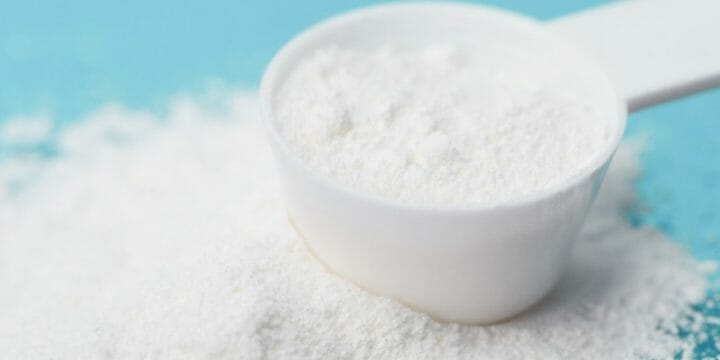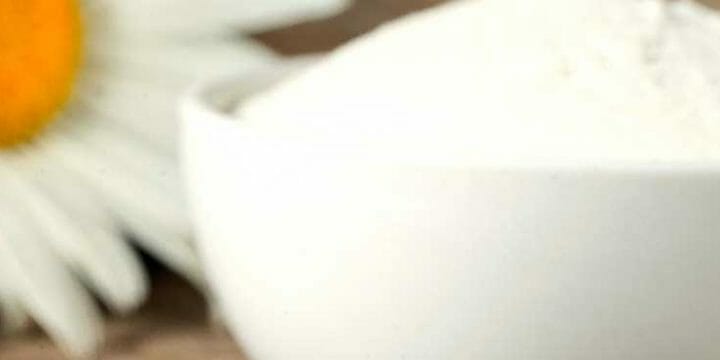When it comes to egg white protein powder vs. whey protein, the debate essentially hinges around whether eggs or milk are a better source.
While Gaston would have us believe his impressive muscles are products of high egg consumption, the facts and science of the argument are a little more complex.
In this article, we're going to look at the benefits each provides as a protein supplement, how they differ, how they match, and which is better for different fitness goals.
Quick Summary
- For those seeking a more natural and simple protein source, egg white protein is ideal, while whey protein is better for higher protein content and flavor variety.
- Whey protein offers a wide range of flavors and is generally palatable even unflavored, whereas egg white protein often has a distinct eggy taste in shakes and smoothies.
- The National Institutes of Health (NIH) study indicates reduced appetite, bone strength enhancement, and muscle growth when whey protein supplements are combined with exercise, taken at 1.4–1.6 g/kg/day.
- In my opinion, egg white protein is a straightforward choice for minimal ingredient seekers, but whey protein's higher protein content and flavor options might be more appealing to others.
How Is Egg White Protein Powder Similar To Whey Protein?

Egg white protein powder and whey protein are alike in providing complete essential amino acids and similar protein content, but differ as egg white protein is dairy-free, making it a suitable option for those with lactose sensitivity.
The main difference between egg-white protein and whey protein is that egg-white protein is dairy-free and contains fewer calories than whey.
Drawing from my experience, having lactose sensitivity, I found switching to egg-white protein powder significantly reduced bloating compared to whey protein.
Both contain all 9 essential amino acids, which means they are both complete proteins.
They also provide a comparable serving in grams of protein per scoop with egg white protein powder, usually giving 24g of protein per scoop, and whey protein powders serving up around 20g to 30g per scoop, depending on the types of whey chosen.
How Are They Different?

Egg white protein powder and whey protein are similar in many ways, but they differ in terms of cholesterol, fat content, and carbohydrate levels.
Egg white protein powder can be considerably higher in cholesterol than whey, with almost three times as much at around 15g per scoop.
Fat content, however, is much lower (read non-existent), as egg white powder has 0g of fat compared to the up to 4g of fat per scoop found in whey.
Egg white protein is also typically lower in carbs than most forms of whey, although purer forms of whey, such as hydrolyzed whey, will be lower still than egg white.
When comparing egg protein powder and whey protein, both are rich sources of amino acids, but whey protein isolate is a better option for individuals with lactose intolerance than whey protein concentrate.
Egg White Protein Powder

Pros
- More allergy-friendly: 65% of the world is dairy-allergic compared to 0.1-2% for eggs, according to insights from Medline Plus [1]. Egg allergies are rare, and often outgrown, unlike common lactose intolerance, especially in East Asians. Try egg white protein if whey upsets your stomach.
- Cheaper: Eggs are cheaper and easier to source than milk, making egg white protein powder less expensive per scoop than whey. It's eco-friendlier too, suitable for those reducing meat intake but not strictly vegan.
- Low in fat and carbs: Ideal for fat loss, egg white protein powder has no fat and minimal carbs. It's a great option for meal replacement shakes or breakfast boosts, offering the best of eggs without the yolk's issues.

Cons
- High in cholesterol: Egg white protein has about three times more cholesterol per scoop than whey, a concern for those monitoring cholesterol intake. While active individuals may not worry, those with high cholesterol or aiming for weight loss might find it problematic.
- Less effective at appetite suppression: A BioMed Central study suggests egg white protein may be less effective in curbing appetite compared to whey [2]. Though based on limited research, it's a point worth considering for fitness enthusiasts.
Whey Protein

Pros
- Proven track record: Whey protein supplements, long favored, are backed by National Institutes of Health (NIH) research. They're linked to reduced appetite, bone strength, and muscle growth, especially with exercise [3].
- Taste: Thanks to its longstanding status as the top protein supplement, whey offers a vast array of flavors for your shakes and smoothies. Even unflavored whey is mild and easy to blend. From my experience, egg white protein powder often has a noticeable eggy taste, hard to mask in any mix.

Cons
- Value and cost: Whey protein is pricier but more expensive doesn't mean better. Cheap whey protein options often contain low-quality fillers and aren't necessarily more effective.
- Calorie count: Whey protein's ingredient list can be tricky. Some brands hide behind "proprietary blends," obscuring what's inside. Others, even with listed ingredients, are packed with additives. In contrast, egg white protein is usually simpler and purer, a better pick for minimal ingredient seekers.
Can You Take Them at the Same Time?

Yes, you can take egg white protein powder and whey protein at the same time without any issues.
They both provide fundamentally the same benefits, and both being animal-derived proteins, have much the same amino acid profile and nutrient profile, too.
If you wanted to take both, you could mix up your morning whey protein smoothie with some egg, even separating out the yolks, if so inclined for a cheaper, whole food variant.
Otherwise, you could take both separately with whey being your workout shake and egg white protein powder used to add protein to your cooking or meals.
Either way, as long as you take the recommended daily intake for these shakes, you will only get optimal health and fitness benefits from both.

References:
- https://medlineplus.gov/genetics/condition/lactose-intolerance/
- https://nutritionj.biomedcentral.com/articles/10.1186/1475-2891-10-139
- https://www.ncbi.nlm.nih.gov/pmc/articles/PMC6142015/
About The Author
You May Also Like






